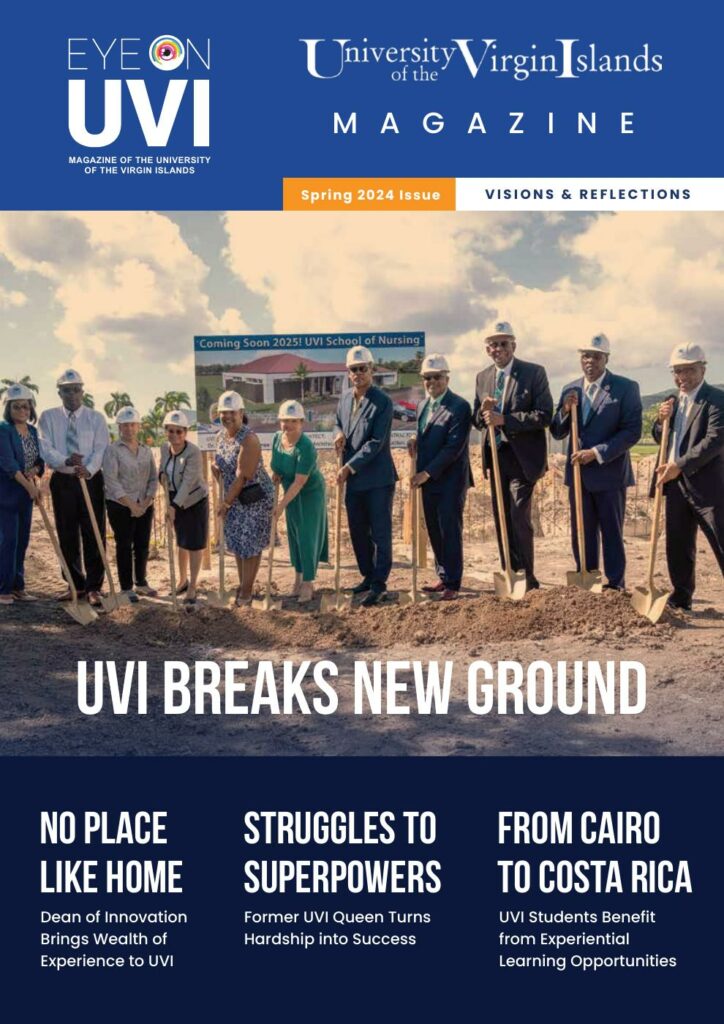Ever since she was a young girl, Zola Roper loved swimming and science. As a child she recalls participating in the Virgin Islands Environmental Resource Station (VIERS) summer camp on Lameshur Bay in St. John, but it was not until she took a marine biology class at Charlotte Amalie High School that she realized how she could combine her two interests into a career. One of the top ten students in her graduating class of 2012, Roper had many options for college. She ultimately chose to attend the University of the Virgin Islands (UVI) because of its renowned marine biology program and a scholarship offer. An added bonus, noted Roper, was being near the ocean.
“UVI was also close to home which made it a really easy transition for me,” said Roper. The decision turned out to be a good one for Roper who, throughout her undergraduate and graduate studies, took advantage of opportunities that also allowed her to travel abroad, gain valuable work experience and conduct her own research. “My advisors supported my decisions and helped to drive my interest in research,” said Roper. This led her to get involved in research on island as well as participate in programs at Savannah State University, Scripps Institution of Oceanography at the University of California, and the Bridge to PhD program at Penn State University.
“If you are interested in STEM, give UVI a chance.”
Zola Roper
After graduating with a Bachelor of Science in Marine Science in 2017, Roper entered the UVI Marine and Environmental Science Master’s program right away. Despite the disruption of Hurricanes Irma and Maria followed by the COVID-19 pandemic, Roper completed the program on schedule. For her master’s thesis entitled ”Spatial and temporal trends in marine debris from a territory-wide, citizen science-collected dataset (1988-2016) in the U.S. Virgin Islands.” Roper analyzed close to 30 years of data collected by community volunteers during coastal cleanups in the Virgin Islands. She looked at the differences between land-based and marine-based debris collection, density of debris found at different sites and on different islands, as well as different collection practices. Among other findings, her analysis revealed that plastic bottles, glass bottles and bottle caps were the items most found during clean ups. Roper explained that while the Virgin Islands has legislation in place for plastic bags, for example, there is currently no legislation related to the use and disposal of plastic and glass bottles.
Dr. Kristin Wilson Grimes, Roper’s master’s thesis advisor and UVI Research Assistant Professor of Watershed Ecology expounded, “All of that data had never been looked at in a comprehensive way. Zola’s work is really important because it can help to inform legislation in the Virgin Islands to prevent marine debris.” In fact, information from her research is now being incorporated into the USVI Marine Debris Action Plan that UVI scientists including Grimes, Roper and others, along with members from local and federal environmental agencies are developing to better inform policies and legislation.
Roper’s research has the potential to make a difference in the Virgin Islands by reducing the threat of garbage to marine life and maintaining clean shores for everyone to enjoy. In addition, her marine education and outreach work allows her to make an impact on Virgin Islands’ students. Before finishing her master’s degree, Dr. Grimes encouraged Roper to apply for the Seas Island Action Alliance Workforce Fellowship, a work/study program funded by the National Science Foundation through the Center for Marine Science at UVI. Roper was awarded the fellowship which allows her to receive a salary for her outreach work with schools while also affording her time to pursue her research activities. In a recent effort, Roper and her colleagues distributed more than 1000 water testing kits to teachers at local schools so students could learn about water filtration and test their own cistern or public water. Roper made virtual presentations to classrooms and collected the information from students for analysis. “I am happy to be a part of this work and I see how teachers appreciate it,” said Roper. “I also enjoy talking with students about what’s happening at UVI with research and about the many great minds behind the research.”
Roper is among those great minds, according to Dr. Grimes. “Her commitment to education is outstanding,” said Dr. Grimes. “Her enthusiasm to give back to the community is inspiring to me. It’s been amazing to see her come into her own, to see her growth and how UVI has been able to support that.”
As for Roper, she is enjoying her outreach work as well as being a core team member of the Marine Debris Action Group, a committee of 77 stakeholders from the VI community working to combat marine debris in the Territory. She is also interested in being an advocate for underrepresented minorities in her field. Her advice to young students: “If you are interested in STEM, give UVI a chance. I feel very fortunate to be exposed to all the great research opportunities and friendships I have made here at UVI.”

